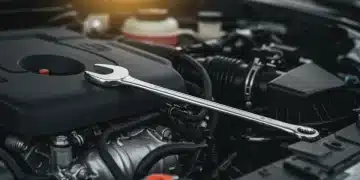Car buying guides help first-time buyers make smart choices

Car buying guides help first-time buyers compare financing, warranty options, test drive experiences, and avoid common mistakes, ensuring they make informed and confident purchasing decisions.
Car buying guides help first-time buyers navigate the complexities of purchasing a vehicle. Are you feeling overwhelmed by the choices? In this guide, we’ll unpack financing options and warranty paths to empower your decision-making.
Understanding financing options for your first car
When considering your first car purchase, understanding financing options is crucial. It can feel overwhelming, but knowing what’s available can help you make an informed choice.
You have several financing options to choose from, including loans, leases, and even cash purchases. Each option has its perks and potential drawbacks.
Types of Financing
Here’s a quick overview:
- Loans: You borrow money from a bank or lender to buy the car. You’ll pay it back over time with interest.
- Leasing: Instead of buying, you essentially rent the car for a set period. Monthly payments are usually lower, but you don’t own the car.
- Cash Purchases: If you have enough savings, paying with cash can save you interest costs and give you immediate ownership.
It’s important to analyze your budget before deciding. Ask yourself how much you can afford for a down payment and what your monthly payments will be. Remember, the total cost of financing can be affected by your credit score and the loan term.
In addition to the type of financing, consider exploring various lenders. Different lenders may offer different rates and terms. Comparing these can be beneficial. Many people find online tools useful for checking rates from multiple sources.
Don’t overlook potential hidden costs, such as maintenance and insurance. These can significantly impact your overall budget. Understanding these costs will help you choose the financing option that suits your financial situation best.
In summary, take the time to research and understand your financing options. This knowledge will empower you to make a confident and smart decision when buying your first car.
Types of warranties for new and used vehicles
When you purchase a vehicle, understanding the warranties available for new and used cars is essential. This knowledge helps protect your investment and ensures peace of mind.
There are primarily two types of warranties: new car warranties and used car warranties. Each provides different coverage options, depending on the vehicle’s age and condition.
New Car Warranties
New cars typically come with extensive warranties that cover many components for several years. These warranties often include:
- Bumper-to-Bumper Warranty: This comprehensive warranty covers most parts and systems, ensuring you’re protected from defects.
- Powertrain Warranty: It covers the engine, transmission, and drivetrain, providing crucial protection against major repairs.
- Corrosion Warranty: This will protect against rust and corrosion damage for a specified period.
Understanding these warranties gives you an advantage. Be sure to check the duration and what is specifically covered, as details can vary by manufacturer.
Used Car Warranties
Used vehicles may come with limited warranties. If buying from a dealer, they might offer:
- Manufacturer’s Certified Warranty: These warranties add assurance, extending protection if the car meets specific criteria.
- Powertrain Warranty: Similar to new vehicles, this often covers critical parts for a certain period, giving used car buyers confidence.
- Extended Warranty: Often purchased separately, this can cover repairs after the original warranty expires.
When considering a used vehicle, be sure to ask about the existing warranties. Sometimes, sellers may offer their own limited warranties.
Always read the fine print and understand the terms before committing. Knowing your options can prevent costly surprises down the road.
Negotiation tips for first-time buyers

When you’re a first-time car buyer, understanding how to negotiate effectively can save you a lot of money. Negotiation is not just about getting a lower price; it’s about finding a deal that works for you.
Before you start the negotiation process, it’s essential to do your research. Know the market value of the car you’re interested in. Websites like Kelley Blue Book or Edmunds can give you an idea of what different models are worth.
Tips for Effective Negotiation
Here are some key negotiation tips to help you get started:
- Set Your Budget: Decide how much you can afford to spend. This includes not only the purchase price but also taxes, registration, and insurance.
- Stay Calm and Confident: Confidence can significantly impact your negotiation. Keep your emotions in check and be willing to walk away if the deal isn’t right.
- Ask Questions: Inquire about the history of the vehicle, its features, and any available warranties. The more you know, the better position you are in to negotiate.
- Be Prepared to Walk Away: Sometimes, the best tactic is to simply walk away if the terms do not meet your needs. This shows the dealer you are serious about getting a fair deal.
As you negotiate, remember that the salesperson is trained to negotiate. A good strategy is to offer a lower price than you’re willing to pay. This gives you room to move up and still stay within your budget.
Don’t rush the process. Take your time to analyze different offers. Sometimes, waiting a day or two can help you make a better decision. Plus, it gives you time to think about the price and offers you’ve received.
Finally, keep in mind that negotiation is a normal part of the car buying experience. By being prepared and following these tips, you can approach the process with confidence.
Common mistakes to avoid when buying a car
Buying a car can be an exciting experience, but also a daunting one for first-time buyers. Making mistakes during this process can lead to regrets later. Here are some common pitfalls to avoid.
One of the biggest mistakes is not doing enough research before you buy. It’s crucial to know the value of the car, its market price, and any special features it may have. Compare prices on websites like Kelley Blue Book or Edmunds to ensure you get a fair deal.
Key Mistakes to Avoid
Here are some common mistakes that first-time buyers often make:
- Skipping the Test Drive: Always test drive the car you want to buy. This helps you gauge its comfort and handling.
- Neglecting Vehicle History: For used cars, check the vehicle history report. It can reveal past accidents or issues that might affect the car’s value.
- Overlooking Total Costs: Remember, the purchase price is not the only cost. Factor in taxes, insurance, and maintenance when budgeting.
Another mistake is focusing too much on monthly payments rather than the total loan amount. While a low monthly payment may seem appealing, it could lead to paying more in interest over time. Always look at the full picture.
It’s also important to not rush into a purchase. Sometimes, taking your time can lead to better deals. Be patient and willing to walk away if the car doesn’t meet your needs.
Additionally, avoid making emotional decisions. Buying a car is a significant financial commitment, and it’s essential to keep emotions in check. Be sure to stick to your budget and plan.
Essential questions to ask during your test drive
When you’re preparing for a test drive, it’s essential to ask the right questions. This can help you determine if the car is truly the best fit for you. Knowing what to inquire about ensures you make a well-informed decision.
During your test drive, consider focusing on the car’s features, comfort, and overall performance. This is your opportunity to see how the vehicle handles in real-time.
Key Questions to Ask
Here are some important questions to consider asking during your test drive:
- What kind of fuel economy can I expect? Knowing the miles per gallon (MPG) rating helps you understand the long-term costs of owning the vehicle.
- Does the vehicle have any safety features? Inquire about safety ratings and features like airbags, anti-lock brakes, and stability control.
- How does the warranty work? Understanding the warranty can provide peace of mind regarding repairs and maintenance.
- Can I see the vehicle history report? For used cars, it’s crucial to check for any accidents or major repairs in the car’s past.
In addition to these questions, try to assess how you feel while driving. Pay attention to visibility, handling, and whether you feel comfortable using the vehicle’s features. Does it feel right?
Finally, remember to ask about the price. Inquire about any promotions or additional fees that could be included in the total cost. Having this information upfront can help you avoid any surprises later.
Buying your first car can be both exciting and overwhelming. By understanding financing options, warranties, and key questions to ask during your test drive, you can make a confident decision. Avoiding common mistakes, like skipping vehicle history checks and not comparing prices, will help you find the right vehicle without unnecessary stress. Remember, taking your time and being informed will lead to a better car-buying experience overall.
FAQ – Common Questions About Buying Your First Car
What should I research before buying a car?
You should research the car’s value, market prices, and safety features to make an informed decision.
How can I know if the financing options are right for me?
Evaluate your budget, including down payments and monthly payments, and compare different loan and lease terms.
Why is it important to take a test drive?
A test drive allows you to assess the car’s comfort, handling, and features to ensure it meets your needs.
What are some common mistakes to avoid when buying a car?
Avoid rushing the decision, skipping vehicle history checks, and focusing only on monthly payments instead of the total cost.





